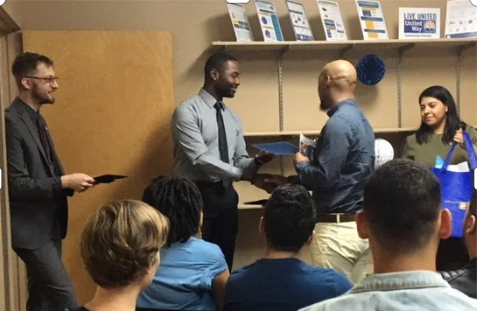Creating Careers through CHAP
Chicago House has been fighting the spread of HIV since our inception. We continue to make great strides through the Getting to Zero Illinois plan, a collaboration between government agencies, health care providers, and sister organizations, with the aim to end the HIV epidemic in Illinois by 2030.
Before this plan was enacted in 2019, Chicago House’s front-line team was already developing innovative strategies to lay the foundation for largescale change. After identifying there was a shortage of qualified Community Health Workers who specialize in HIV testing and represent the populations being served, Chicago House piloted a certification program to train up individuals interested in health equity.
We shared our challenge and solution with our sister organizations and learned that most were struggling to fill gaps in their prevention departments. Our team then researched community needs, developed a programmatic framework, and delivered a model for the Community Health Apprenticeship Program (CHAP). Thanks to seed funding from Gilead Sciences, Chicago House launched the program in 2017, and our success ever since speaks for itself.
“In CHAP we center the experiences of Black, Latinx, LGBTQIA+ young folks [aged 18 to 34], and within those communities there are a great deal of nuance when it comes to experience - Black Trans Women, Non-Binary Latinx Persons, Black Bisexual Cisgender Men, Latina Lesbians,” says Xay Fisher, CHAP Coordinator. “Every time recruitment begins, it's very exciting to see the potential of who may be mixed into the CHAP family. With these unique, nuanced experiences collaborating on our curriculum, we get some very dynamic work accomplished. The apprentices using their lived experience in the cohort really helps with keeping us accountable and abreast of potential new information or things to consider.”
The 6-week paid training has launched new careers in community health work for over 100 individuals. Having recently completed its 27th cohort, CHAP has undergone significant changes over the years, particularly through the pandemic when the previously hands-on training that included field trips to service providers had to shift to remote learning. Program leaders helped maintain a strong connection with participants and leveraged the growing alumni network to sustain contact beyond graduation.
That innovative thinking during a tumultuous time set even more individuals up for success. Along with pursuing roles at sister organizations, like Center on Halsted and Howard Brown, Chicago House has hired over 20 graduates so far, with 12 alumni currently on staff. This is about 10% of our total workforce, with 6 individuals working as managers!
“The curriculum, much like the rest of the world, is constantly growing and evolving, so in an effort to keep up in delivering accurate information we are always paying attention to new studies of HIV/AIDS, Gender and Race theory, and Employment information,” continues Xay, who graduated from the program herself in 2020 and was hired by Chicago House shortly after. “By accessing our services, folks will inform their personal communities on the assistance that they received, and it draws new people to our programming all the time. Many applications for our program we receive are referrals from previous CHAP apprentices, and this in turn creates a community of informed and galvanized folks to step out into the world and do more work within community. It's a very beautiful cyclical effect, and it's an honor and privilege to be able to do this work.”
Cohort 27 recently graduated! Follow our social channels (@chicagohouse85) to hear from our apprentices and alumni about how CHAP is changing the Community Health Worker game.


